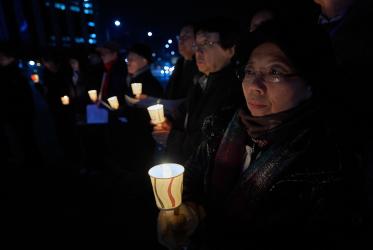Displaying 41 - 60 of 133
HIV and AIDS Civil Society Networks and the Faith Sector
Lessons Learnt from Strategic Engagement in India, Dominican Republic, Indonesia, and Jamaica
31 January 2023
As Bethlehem prepares for Christmas, ‘it’s all about community’
08 December 2022
Gracia Ross: “Responding to HIV is a moral obligation”
27 September 2022
Strengthening Christian Perspectives on Human Dignity and Human Rights
Perspectives from an International Consultative Process
19 August 2022
Cooler Earth - Higher Benefits (Third Edition)
Actions by those who care about children, climate, and finance
16 August 2022
Called to Transformation - Ecumenical Diakonia
09 June 2022



















